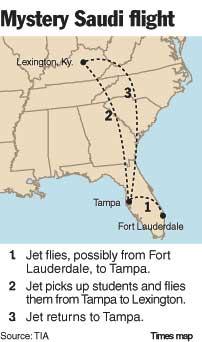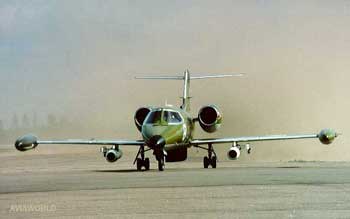|
Is the timing
of this verification another diversion to invade Saudi
Arabia, or a credible step towards the 9/11 cover-up?
 The
government has long denied that two days after the 9/11
attacks, the three were allowed to fly. The
government has long denied that two days after the 9/11
attacks, the three were allowed to fly.
TAMPA - Two days after the Sept. 11 attacks,
with most of the nation's air traffic still grounded,
a small jet landed at Tampa International Airport, picked
up three young Saudi men and left.
The men, one of them thought to be a member of the Saudi
royal family, were accompanied by a former FBI agent and
a former Tampa police officer on the flight to Lexington,
Ky.
The Saudis then took another flight out
of the country. The two ex-officers returned to TIA a
few hours later on the same plane. For nearly three years,
White House, aviation and law enforcement officials have
insisted the flight never took place and have denied published
reports and widespread Internet speculation about its
purpose...
But now, at the request of the National
Commission on Terrorist Attacks, TIA officials have confirmed
that the flight did take place and have supplied details.
The odyssey of the small LearJet 35 is
part of a larger controversy over the hasty exodus from
the United States in the days immediately after 9/11 of
members of the Saudi royal family and relatives of Osama
bin Laden.
 |
| A LearJet 35. No other planes were allowed to
fly during the days after September 11, 2001. |
The terrorism panel, better known as the
9/11 Commission, said in April that it knew of six chartered
flights with 142 people aboard, mostly Saudis, that left
the United States between Sept. 14 and 24, 2001. But it
has said nothing about the Tampa flight.
The commission's general counsel, Daniel
Marcus, asked TIA in a letter dated May 25 for any information
about "a chartered flight with six people, including
a Saudi prince, that flew from Tampa, Florida on or about
Sept. 13, 2001." He asked for the information no
later than June 8.
TIA officials said they sent their reply
on Monday.
The airport used aircraft tracking equipment
normally assigned to a noise abatement program to determine
the identity of all aircraft entering TIA airspace on
Sept. 13, and found four records for the LearJet 35.
The plane first entered the airspace from
the south, possibly from the Fort Lauderdale area, sometime
after 3 p.m. and landed for the first time at 3:34 p.m.
It took off at 4:37 p.m., headed north. It returned to
Tampa at 8:23 p.m. and took off again at 8:48 p.m., headed
south.
Author Craig Unger, who first disclosed
the possibility of a post-9/11 Saudi airlift in his book
House of Bush, House of Saud, said in an interview that
he believes the jet came to Tampa a second time to drop
off two former law enforcement agents from Tampa who accompanied
three young Saudis to Lexington for security purposes.
The Saudis asked the Tampa Police Department
to escort the flight, but the department handed off the
assignment to Dan Grossi, a former member of the force,
Unger said. Grossi recruited Manuel Perez, a retired FBI
agent, to accompany him. Both described the flight to
Unger as somewhat surreal.
"They got the approval somewhere,"
Perez is quoted as telling Unger. "It must have come
from the highest levels of government."
While there is no manifest for those aboard
the Lear flight to Kentucky, Unger says the foreign nationals
left Lexington for London aboard a Boeing 727. That manifest
lists eight Saudis, two Sudan nationals, one Tunisian,
one Philippine citizen, one Egyptian and two British subjects.
Of those, three listed residences on Normandy
Trace Drive in Tampa, and all of them held Florida drivers'
licenses. They are Ahmad Al Hazmi, then 19, Fahad Al Zeid,
then 20, and Talal M. Al Mejrad, then 18, all male Saudis.
It is not known which, if any, is a Saudi
prince.
Perez, the former FBI agent on the flight,
could not be located this week, and Grossi declined to
talk about the experience.
"I'm over it," he said in a
telephone interview. "The White House, the FAA and
the FBI all said the flight didn't happen. Those are three
agencies that are way over my head, and that's why I'm
done talking about it."
Grossi did say that Unger's account of
his participation in the flight is accurate.
The FAA is still not talking about the
flights, referring all questions to the FBI, which isn't
answering anything, either. Nor is the 9/11 Commission.
Unger's book criticizes the Bush administration
for allowing so many Saudis, including the relatives of
bin Laden, to leave the country without being questioned
thoroughly about the terrorist attacks...
Despite evidence that the flight occurred,
several new questions have arisen.
Raytheon Aircraft is the only facility
at TIA that services general aviation, which includes
charter flights. When appropriate, Raytheon collects landing
fees from those aircraft for TIA and reports to TIA on
the flights.
According to airport records, Raytheon
collected landing fees from only two aircraft on Sept.
13, one of them a Lear 35. But according to the record,
the registration on the Lear is 505RP, a tail number which,
according to the latest federal records, is assigned to
a Cessna Citation based in Kalamazoo, Mich., and Oskar
Rene Poch.
Poch confirmed Tuesday that he owns a
Citation with that tail number and did before the terrorist
attacks.
"Somebody must have gotten the registration
number wrong in Tampa," he said.
TIA spokeswoman Brenda Geoghagan said
it is believed the Lear's Sept. 13 journey began in Fort
Lauderdale, possibly at a charter company called Hop-a-Jet
Inc. The fact that the four trips in and out of Tampa
all carried the flight designation "HPJ32" lends
support to that idea.
But an official of Hop-a-Jet who wouldn't
identify himself said the company does not own an aircraft
with the registration number 505RP. Furthermore, he said,
if that tail number is assigned to a Cessna Citation,
the company doesn't own any Citations, either.
Most of the aircraft allowed to fly in
U.S. airspace on Sept. 13 were empty airliners being ferried
from the airports where they made quick landings on Sept.
11. The reopening of the airspace included paid charter
flights, but not private, nonrevenue flights.
"Whether such a (LearJet) flight
would have been legal hinges on whether somebody paid
for it," said FAA spokesman William Shumann. "That's
the key."
- St. Petersburg Times researcher Kitty
Bennett contributed to this report
|